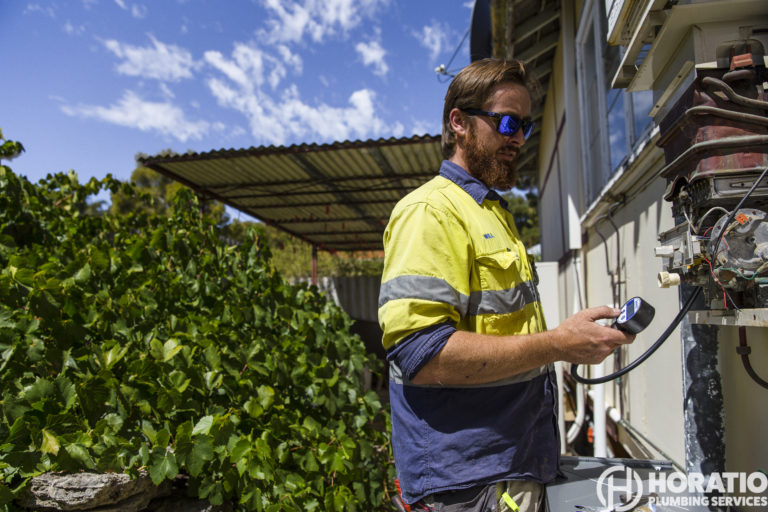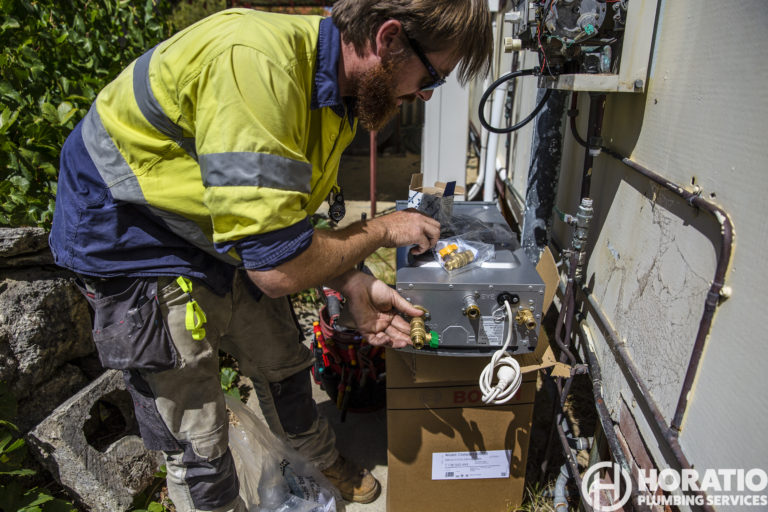Hot Water Units
Every house needs hot water, and in Perth the majority of hot water systems are either Gas storage, Solar hot water or Gas instantaneous. Every hot water unit has its benefits and pro’s and cons, Gas storage is cheap to install and supply, however has a higher running cost than an instantaneous. An instantaneous is expensive to initially install, however is extremely efficient and cheaper to run than a storage. Area’s without gas, or sometimes older/newer apartments still run electric storage hot water units. Electric hot water units, excluding heat pumps are the least efficient units on the market, however they are much cheaper to install than a gas storage or any other type of hot water unit – only if you have power located close by to run the unit. Sometimes people opt to install electric units as a cheap way to get hot water quickly in an emergency situation.
The leading cause to hot water failure is tank rupture, this usually occurs after 8 to 12 years of service (electric units have much shorter lifespans). The biggest cause of this is failure to maintain the hot water system properly, there are sacrificial anodes inside the tank that are required to be replaced every five years, include the hot and cold relief valves. By carrying out this simple maintenance you extend the life of your hot water tank significantly. Another problem is the poor water quality in Perth, calcium builds up inside the tank and causes premature ware and corrosion – the only way to fix this is to install a whole house filter to protect your water supply from contaminants.
Types Of Hot Water Systems
- Uncontrolled heat sources: Units that fall into this category are solar hot water, solid/liquid fuel burners, and geothermal sources such as hot springs etc.
- LPG/Natural gas powered: Units that fall into this category are storage units, which hold between 80 to 360L of hot water. Instantaneous/continuous flow units, which heat the water as water is required, they consume a higher rate of gas, however can be very economical compared to storage.
- Electric units: Units that fall into this category are storage units, which hold between 50 to 170L + of hot water. Instantaneous/Continuous flow units, such as the Simple X / Super X, Stiebel. Electron units and kitchen units, such as the Zip Hydroboil, Birko or Rheem. Heat pumps, which range from 135 to 200L + Litres, which work on refrigeration principles in reverse.
At the moment with the current Natural Gas and Electricity price, the most efficient units are as follows;
- Solar gas boosted hot water system
- Electric heat pump system
- Solar electric boosted / Gas Continuous flow
- Gas storage
- Electric continuous flow
- Electric storage
Maintenance & Repairs
 The average working life of a hot water unit, depending on the location in Western Australia is between 8 to 15 years, however we have come across some units pushing 20+ years of service, working perfectly. One of the main causes of hot water tank failure is the water quality, so installing a good whole house filter will decrease the internal corrosion of the tank by preventing iron / other metallic substances in the water supply getting into the tank. Installing the unit out of the weather is also good practice for extending the working life of the unit, as units exposes to the weather tend to rust / break down due to corrosion and become unserviceable.
The average working life of a hot water unit, depending on the location in Western Australia is between 8 to 15 years, however we have come across some units pushing 20+ years of service, working perfectly. One of the main causes of hot water tank failure is the water quality, so installing a good whole house filter will decrease the internal corrosion of the tank by preventing iron / other metallic substances in the water supply getting into the tank. Installing the unit out of the weather is also good practice for extending the working life of the unit, as units exposes to the weather tend to rust / break down due to corrosion and become unserviceable.
Hot water units require maintenance to keep them running and to extend their working life, maintenance includes changing the sacrificial anode every 6 to 12 months, depending on your location and water quality. Changing the anodes regular will significantly increase the working life of your unit. Hot and cold water relief valves also need to be operated every six to twelve months, making sure they are in correct working order, not seized or unable to be opened or close. With a storage hot water system, you would expect to change the hot and cold water relief valves once to twice in the working life of the unit. As far as maintenance goes, storage units (Solar, electric and gas) are the only hot water systems that require regular maintenance. Continuous flow units will require parts from time to time, however they don’t require regular maintenance.
If you require a new hot water system, servicing of a faulty hot water system, or require advice about the best type of hot water system to suit your needs please contact Will.
Installation Costs
 The average install cost of a system can range between $800 to $3,500 depending on the type of unit to be installed. The price of a quote always reflects to the amount of work that is required to be carried out and the cost of materials. The average time to install a system ranges between 2 hours to 7 hours, depending on the work that needs to be done. A simple change over shouldn’t take more than 2.5 hours, however a larger full install including new water pipes and gas pipes can sometimes take up to a full day, depending on the scope of works and the difficulty of the job. Some Perth plumbing companies have minimum costs and large markups, Horatio Plumbing Services keeps with industry standard markups and Master Plumbers Association of WA recommend prices and rates. As a rule of thumb you would roughly be looking at the following for installation;
The average install cost of a system can range between $800 to $3,500 depending on the type of unit to be installed. The price of a quote always reflects to the amount of work that is required to be carried out and the cost of materials. The average time to install a system ranges between 2 hours to 7 hours, depending on the work that needs to be done. A simple change over shouldn’t take more than 2.5 hours, however a larger full install including new water pipes and gas pipes can sometimes take up to a full day, depending on the scope of works and the difficulty of the job. Some Perth plumbing companies have minimum costs and large markups, Horatio Plumbing Services keeps with industry standard markups and Master Plumbers Association of WA recommend prices and rates. As a rule of thumb you would roughly be looking at the following for installation;
Electric continuous flow $800 to $1,200
Electric Storage $900 to $1,450
Gas Storage $1300 to $1950
Gas Continuous Flow $980 to $3,700
Heat Pump $3,000 to $3,500
Solar hot water $1,900 to $5,800
PRICING
| Gas instantaneous | Price |
|---|---|
| BOSCH 10P SUPPLY & INSTALL | $951* |
| BOSCH 16P | $1,167.50* |
| BOSCH 10H | $1,064.10* |
| BOSCH 13H | $1,167.50* |
| BOSCH 16H | $1,186.50* |
| Gas storage | Price |
|---|---|
| Therman 4* 135L (Replaces Vulcan 135L) | $1,160.00* |
| Rheem 135L | $1,469.25* |
| Dux 135L | $1,170.00* |
| Everhot 4* 135L | $1,247.40* |
| Therman 4* 170L | $1,270.70* |
| Everhot 5* 135L | $1,379.30* |
| Rheem Stella 130L | $1,600.28* |
| Rheem Stella 160L | $1,700.00* |
| Continuous flow | Price |
|---|---|
| Simple X 3 phase hot water unit | $830.00* |
| Super X 3 phase hot water unit | $800.00 |
| Storage | Price |
|---|---|
| Therman Electric 25L | $702* |
| Therman Electric 50L | $710* |
| Therman Electric 80L | $836.60* |
| Therman Electric 125L | $912.65* |
| Therman Electric 160L | $962.50* |
| Everhot 25L | $725* |
| Everhot 50L | $735* |
| Everhot 80L | $900* |
| Everhot 125L | $975.45* |
| Rheem 25L | $767.45* |
| Rheem 50L | $777.45* |
| Rheem 80L | $1,005.50* |
| Rheem 125L | $1,140.35* |
